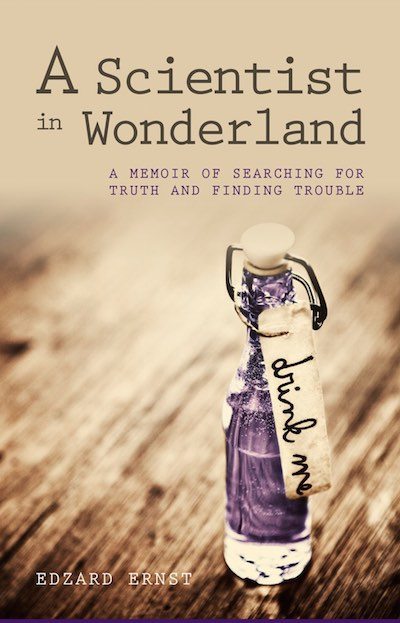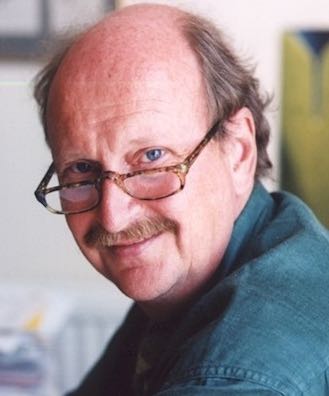Edzard Ernst is one of those rare people who dare to question their own beliefs, look at the evidence without bias, and change their minds. He went from practicing alternative medicine to questioning it, to researching it, to becoming its most prolific critic. I have long admired his work, and I finally met him in person when we were invited to speak at the same conferences. He shattered my stereotype of the stern, formal, self-important German “Herr Professor Doktor.” He was affable, unassuming, and funny; he was even a jazz musician. I wished I knew more about his history, and my wishes have been granted in the form of his new autobiographical book, A Scientist in Wonderland: A Memoir of Searching for Truth and Finding Trouble.

This is a well-written, entertaining book that anyone would enjoy reading and that advocates of alternative medicine should read: they might learn a thing or two about science, critical thinking, honesty, and the importance of truth.
Edzard Ernst, the early years
Dr. Ernst was born in post-war Germany; his family had suffered greatly during the war and his uncle had been a general in the Waffen SS. He felt slightly ashamed to be German, and as a result he researched and wrote about Nazi health beliefs and medical atrocities so the history of their misdeeds would not be forgotten.
His father was a doctor, his mother an enthusiastic devotee of alternative medicine who subjected him to homeopathy, ice cold baths, and barefoot walks at dawn through wet grass. Early in life, Ernst began to manifest a tendency towards doubt and irreverence, along with an irrepressible sense of curiosity.
Music was his first love. He earned good money when he and his friends spent their summer vacation busking on the beach at St. Tropez, and he had been seriously considering a musical career until his mother persuaded him to study medicine. He earned an MD in Germany, in an environment where alternative medicine was unquestioningly integrated with mainstream medicine. He received hands-on training in acupuncture, autogenic training, herbalism, homeopathy, cupping, massage therapy, spinal manipulation, even leeches. His first job was in a homeopathic hospital where a colleague chose remedies by dowsing with a pendulum.
He went through series of unsatisfying jobs. During one brief stint working in a psychiatric hospital, he discovered that several of his female patients were sneaking out at night and prostituting themselves to passing truck drivers. Appalled, he tried to put a stop to it, but his boss told him not to rock the boat, to mind his own business and let the wretched women earn some pocket money. Ernst never liked to take orders, and rocking the boat became a familiar occupation for him, one that had the potential for good but was a sure way of making powerful enemies.
He earned a PhD and eventually held a prestigious position as chairman of Physical Medicine and Rehabilitation at the University of Vienna. He detested the political intrigues and backstabbing in the Austrian academic community; and he found he had less and less time for research, which gradually became his primary interest. He was prescribing all kinds of rehabilitation treatments that had never been properly tested. He wanted to test them and find out which ones were really effective.

Telling the truth, no matter what (even about princes)
He jumped at the chance to become the world’s first professor of Complementary Medicine at the University of Exeter in England, even though it meant halving his salary. After some initial misunderstandings about his role, he managed to build a research team dedicated to answering questions about the safety, efficacy, and cost of alternative medicines. They conducted over 40 clinical trials and 300 systematic reviews, eventually compiling a total of over 1,000 published articles in medical journals. There was a backlash from those who rejected scientific challenges to their religious-like beliefs. He discovered a culture of unreason that was curiously indifferent to the concept of truth: the Wonderland of the title.
The vitriol directed at him was astounding. He was such a thorn in the side of homeopathy that several large German manufacturers of homeopathic remedies paid a journalist to publish defamatory articles about him. This constitutes the height of irony, considering that Ernst has repeatedly been falsely accused of being in the pay of Big Pharma.
Eventually his outspoken dedication to scientific truth ran afoul of interested parties in high places, including Prince Charles, who is a big supporter of homeopathy and all things alternative, and even founded a company that sells a product called Duchy Originals Detox Tincture. Imagine the uproar when a journalist asked Ernst if Prince Charles was a snake oil salesman and he felt obligated to answer yes! Ernst tells the whole sordid story of how his opponents attempted to muzzle him, succeeded in cutting off his research funding, and forced him into early retirement. He says he looks back on his career with a mixture of satisfaction and incredulity.
Bringing science to alternative medicine
In addition to being a memoir, Dr. Ernst’s book is a paean to science. It explains why science is necessary, how the scientific method works, and how studies can be misleading if researchers are not rigorous or don’t use proper controls. His team developed a retractable “stage dagger” needle as a control in acupuncture studies, and they worked closely with alternative medicine providers to design meaningful experiments.
In one of their early studies, they evaluated the claims of “healers” who believed they could channel an alleged universal healing energy into the bodies of their patients. He describes step-by-step how they developed a research design that satisfied both the healers and the requirements of scientific rigor. They had to agree on what to study (chronic pain), a treatment schedule (8 sessions), and an intervention that could be used as a placebo control. The healers at first failed to understand the need for controls; they wanted to simply measure patients’ pain levels before and after their treatments. But they were eventually persuaded that controls were needed for unambiguous results, since symptoms can resolve spontaneously over time and apparent improvement can be due to placebo effects. Sham healers (trained actors) were tried, but the healers discovered that the actors seemed to have real healing powers too! They thought of putting the healer in a cubicle adjacent to the patient but not visible to the patient, but the healers were concerned that that might impair the healing energy. They finally decided on a four-arm experiment that all parties were satisfied would be a fair trial:
- Healing by one of the five healers in the presence of the patient
- Placebo healing by an actor in the presence of the patient
- Healing by one of the five healers hidden from view in a cubicle
- Placebo healing with no one in the cubicle.
The results? All four groups demonstrated considerable pain reduction, but there was no statistically significant difference between the groups; if anything the placebo group did a little better. The healers urged them not to publish the findings, saying it might dissuade patients from trying something that would help them. But unpublished science is not science. Not publishing would deprive other scientists of the chance to replicate the experiment. Even if all it showed was the power of the placebo, it could contribute to knowledge by demonstrating the non-specific effects of treatment. Those nonspecific effects are present in every provider-patient encounter and would be better harnessed to contribute to the success of treatments that have specific effects too.
He shows how misguided ideas, poor reasoning, and inaccurate publicity have contributed to the spread of alternative medicine. He debunks the many logical fallacies such as the appeal to popularity and the idea that everything natural must be good. That chapter alone is worth the price of the book.
Uncomplimentary of complementary medicine
He ends with a 3-page summary of the conclusions from his research on various forms of alternative medicine, from acupuncture to chiropractic. He had started out with a very favorable attitude towards alternative medicine, wanting to find out what really worked; he found that not much did. He is not complimentary about complementary medicine. As for integrative medicine, he says it attempts to integrate quackery with science and is “nothing less than a profound betrayal of the ethical basis of medical practice.”
One thing shines throughout Ernst’s story: his uncompromising integrity and courage. He has always spoken the truth without regard to the personal consequences. He says, “I had to abide by my own scientific, moral and ethical standards… I did not have a choice… and come to think of it, I would do it all over again if I had to.” The word hero is overused in today’s media, but to my mind Edzard Ernst is a true hero. He continues to be one of our leading warriors in the battle to defend science and conquer unreason.
This is a well-written, entertaining book that anyone would enjoy reading and that advocates of alternative medicine should read: they might learn a thing or two about science, critical thinking, honesty, and the importance of truth.
Dr. Ernst is active online. He blogs and Tweets regularly: see EdzardErnst.com and @edzardernst.
